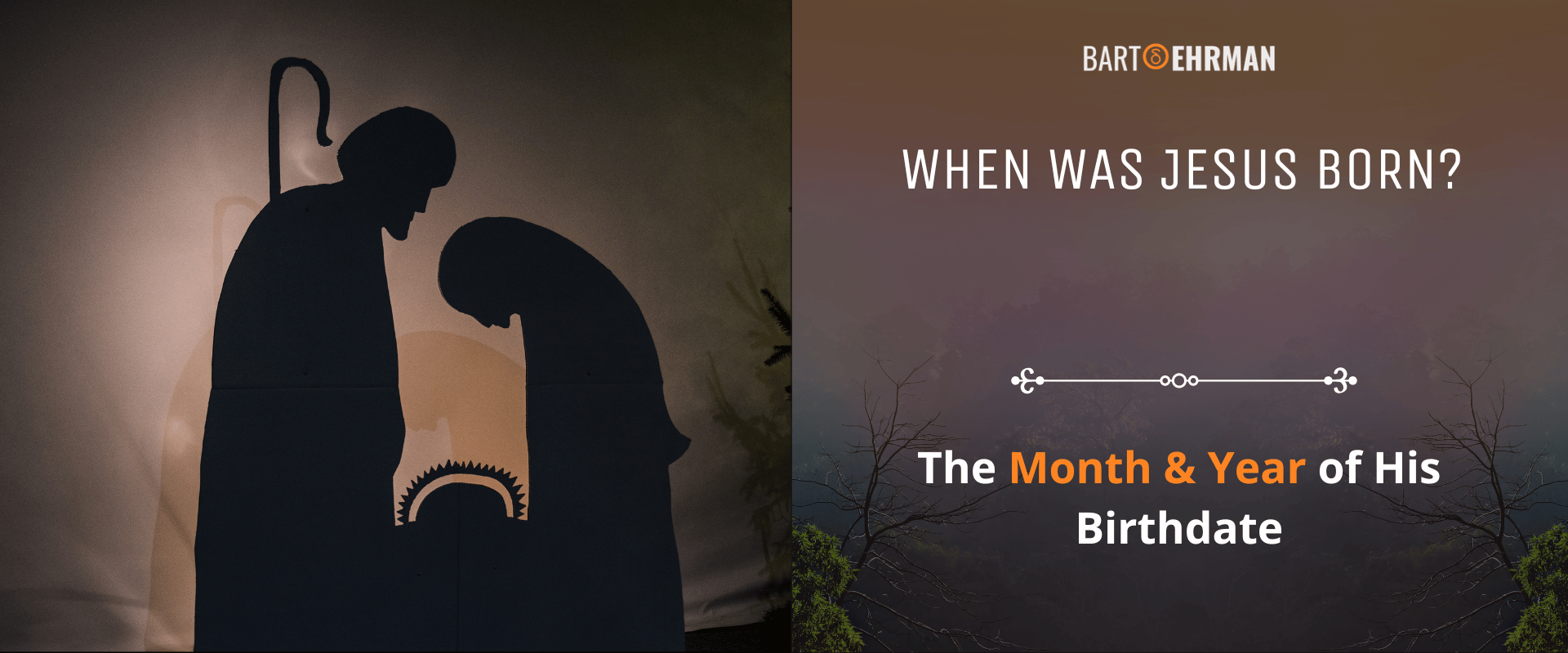When Was Jesus Born? The Month & Year of His Birthdate

Written by Marko Marina, Ph.D.
Author | Historian | BE Contributor
Verified! See our editorial guidelines
Disclaimer: The views and opinions expressed in this article belong to the author and do not necessarily match my own. - Dr. Bart D. Ehrman
As we find ourselves amidst the festive cheer of December, the question, “when was Jesus born?” resurfaces with renewed interest. This simple query, deeply entwined with the essence of Christmas, has been a subject of scholarly debate and historical analysis.
This article aims to delve into the labyrinth of historical records and theological texts, examining the theories that attempt to pinpoint the exact year, month, and day of his birth. Was Jesus born in October? Or maybe it was April. What was the year, month, and day of Jesus Christ’s birth?
The following scholarly exploration invites readers to journey back through time, uncovering the layers of history and tradition that surround one of the most pivotal figures in human history.
Before we embark on our journey, I invite you to further expand your understanding with “Did the Christmas Story Really Happen” - a captivating lecture series by renowned scholar Dr. Bart D. Ehrman. This series offers an in-depth analysis of the birth of Jesus from a historical perspective. Dr. Ehrman meticulously examines the biblical narratives, cross-references historical sources, and addresses the intriguing complexities surrounding the Christmas story!

When Was Jesus Born? Getting the Proper Historical Context
The quest to uncover the time when Jesus was born must start with an examination of the earliest sources. The most direct and historically significant accounts of Jesus’ birth are the Gospels of Matthew and Luke. These texts, although written several decades after Jesus’ life, provide narratives that profoundly shaped the Christian understanding of Jesus’ nativity story.
The author of Matthew describes the appearance of the star and the visit of the Magi, while Luke’s account introduces the census under Quirinius, the journey from Nazareth to Bethlehem, and the famous manger scene.
These narratives present challenges to historians due to their theological motivations and the time gap between the events they describe and their actual composition. That alone should warn us that the question of, “when was Jesus born?” isn’t that simple.
Beyond these Biblical accounts, other historical sources on Jesus’ birth are scarce and indirect. The Jewish historian Josephus (c. 93 C.E.) briefly mentions Jesus but doesn’t provide details on his birth. Moreover, an apocryphal Proto-Gospel of James written in the 2nd century gives us an elaborate story about Jesus’ birth but it’s highly legendary.
The lack of evidence shouldn’t surprise us! As John P. Meier notes: “Jesus was a marginal Jew leading a marginal movement in a marginal province of a vast Roman Empire. The wonder is that any learned Jew or pagan would have known or referred to him at all in the 1st or early 2nd century.”
This scarcity of contemporary records poses a significant challenge for historians, who must rely heavily on the Gospels' accounts, interpreting them within their historical and cultural contexts.
The World When Jesus Was Born: The Political Landscape
The Roman Empire, a colossal power that extended its influence across the Mediterranean dominated the political landscape of the world during the time of Jesus’ birth. A key figure in setting this historical stage was the Roman emperor, a position that prompts the question: Who was the Roman emperor when Jesus was born?
The answer leads us to Caesar Augustus, known for his transformative leadership that ushered in a period of relative peace and stability known as the Pax Romana, or Roman peace.
Augustus, who reigned from 27 B.C. to C.E. 14, implemented administrative reforms, expanded the road network, and fostered an era of cultural flourishing. His reign represented a shift from the tumultuous era of Roman republicanism to an empire under the control of an individual ruler.
Under Augustus' rule, the Roman Empire was characterized by a complex political and social structure. The empire, although vast and diverse, was tightly controlled from the center, with provinces governed by Roman officials.
This era also saw the expansion of Roman law and citizenship, a vast trade network, and a relative degree of religious tolerance. However, in the provinces, especially in regions like Judea, there were undercurrents of unrest and dissatisfaction with Roman rule - often in the form of self-proclaimed apocalyptic prophets who stood up against Rome convinced that God would soon intervene on their behalf.
So, when was Jesus born? His birth happened within the broader environment of political stability mixed with local discontent. Jesus’ birth, set against the backdrop of Augustus’ reign, marked the beginning of a new chapter in history. But can we peel the layers of uncertainties and find out more about the exact date of Jesus’ birthday?
When Was Jesus’ Actual Birth? Month, Day, and Year
Determining the precise year, month, and day of Jesus Christ’s birth poses a great challenge for historians. Despite its significance in the Christian tradition, the exact day, month, and year when Jesus was born remains the subject of debates and scholarly conjectures.
The challenge isn’t unique to Jesus. In the Roman Empire, where various systems of dating were in use and local calendars often differed, pinpointing the exact birth dates of even the most prominent figures presents a complex puzzle.
What Was Jesus’ Birth Year?
The scholarly consensus on the year of Jesus’ birth is predominantly centered around the period from 7 B.C.E. to 4 B.C.E. This range is mostly derived from the evidence given to us by the Gospel of Matthew.
Ed P. Sanders observes: “Most scholars, I among them, think that the decisive fact is that Matthew dates Jesus' birth at about the time Herod the Great died. This was in the year 4 B.C.E., and so Jesus was born in that year or shortly before it; some scholars prefer 5, 6 or
even 7 B.C.E.”
Some authors even turned to astronomical data and tried to utilize Matthew’s mention of the star that guided the Magi to baby Jesus. Peter Barthel and George van Kooten suggested that the star was an actual astronomical event (the appearance of Jupiter in conjunction with the sun) that occurred on April 17 6 B.C.E.
I’m not sure whether we should extrapolate too much of history from Matthew’s and Luke’s birth narratives. Gerd Theissen and Annette Merze note: “Our conclusion must be that Jesus came from Nazareth. The shift of his birthplace to Bethlehem is a result of religious fantasy and imagination: because according to scripture the messiah had to be born in Bethlehem, Jesus' birth is transferred there.”
Did you think Jesus was certainly born in Bethlehem? If you did, check out our earlier article and find out the surprising truth!
To put it more bluntly, the essence of the New Testament birth narratives is regarded by the majority of scholars as the result of religious fantasy and theological imagination.
Therefore, I remain highly skeptical about any suggestion that is based on the extrapolation of too much history from these accounts. Sometimes, it’s too easy to slip from history to imagination without even knowing.
What year was Jesus born? We can only make broader conclusions and place Jesus’ birth year somewhere between 7 and 4 B.C.E.
Did You Know?
The historical dating of Jesus’ birth presents a fascinating paradox. How can Jesus be born “Before Christ”? The paradox arises from a miscalculation by the 6th-century monk Dionysius Exiguus who was responsible for the creation of the Anno Domini (A.D.) or “In the Year of the Lord” system. Dionysius aimed to pinpoint the year of Jesus’ birth but his calculations didn’t account for several historical factors such as the reign of King Herod who died in 4 B.C.E.
Another clue as to the year of Jesus’ birth is how his birth story lines up with Mary and Joseph’s flight to Egypt to escape the “slaughter of the innocents” (or Massacre of the Innocents) at the direction of King Herod, a story found only in Matthew.
Note that King Herod is not to be confused with the Herod whom Jesus calls “that fox” in Luke, chapter 13.
So which Herod ruled when Jesus was born? It was King Herod, also known as Herod the Great - an important figure in Judean history. He was the reigning monarch in Judea during the estimated time of Jesus’ birth.
Appointed by the Romans as the King of Judea, Herod’s rule spanned from 37 B.C.E. to 4. C.E. which aligns him with the historical period inferred for Jesus’ nativity. The Gospel of Matthew’s account of the Massacre of the Innocents further cements his place in the narrative surrounding Jesus’ early life.
Following the death of Herod the Great, the rule over Judea was divided among his sons. When Jesus was a baby, the region of Judea was under the jurisdiction of Herod Archelaus. Another son, Herod Antipas, ruled over Galilee - a position he held from 4 B.C.E. to 39 C.E.
Herod Antipas is the “fox” that Jesus refers to in Luke 13.

What Was Jesus’ Birth Month? Was it October, December, or April?
Theories concerning the exact month when Jesus was born have been and still are a topic of scholarly debate. One of the most commonly suggested months is December. This is a traditional Church theory built upon the celebration of Christmas on December 25th.
However, this theory is often contested by historians who remind us that we don’t possess early information about the month of Jesus’ birth. Furthermore, they argue that the shepherds’ presence in the fields (the Gospel of Luke) would be unusual for the cold winter months in Judea.
Was Jesus born in October? An alternative theory suggests precisely that. This hypothesis aligns with the Jewish festival of Sukkot, also known as the Feast of Tabernacles which occurs in autumn. Proponents of this theory point to the symbolism of God's “tabernacling” (dwelling) among humans.
Was Jesus born in April? Well, some people seem to think so! Their theory is based on the assumption that Spring would have been a more appropriate time of year to conduct an empire-wide census that Luke mentions in his narrative of Jesus’ birth.
Moreover, proponents of this theory rely on the fact that some Christian groups in the late 2nd century, as mentioned by Clement of Alexandria, celebrated Christmas around March or April.
In attempting to answer, “when was Jesus born?” we inevitably confront the reality that certainty about the exact month of his birth eludes us. The primary sources for all the theories are the birth narratives of Matthew and Luke.
However, they are filled with historical problems and discrepancies that challenge their reliability as precise historical records. These accounts, written decades after Jesus’ life by people who didn’t know him, blend theological motifs such as the virgin birth with historical elements. Consequently, it’s difficult to extract factual details with confidence.
Put more simply, the lack of early, unambiguous evidence means that any conclusion about the exact month of Jesus’ birth remains highly speculative.
What Was Jesus’ Birth Day?
The intriguing question of “When was Jesus born?” extends beyond the year and month to encompass our curiosity over the specific day of his birth. As a historian, I would love to know the exact day of Jesus’ birth. But often historical records aren’t kind to us!
While the 25th of December has become the traditional date celebrated as Christmas, the accuracy of this date is highly problematic. Consequently, virtually no scholar would claim that Jesus was actually born on December 25th.
Diving deeper into the historical sources yields no definitive answer to the exact day of Jesus’ birth. The Gospels, our primary sources for Jesus’ life, are silent on that issue. Given the lack of any evidence and the symbolic nature of the December 25th date, it’s likely that the precise day of Jesus’ birth will remain a mystery.
Summing up Conclusion: When Was Jesus Born?
As we reach the end of our journey, the question of when was Jesus born continues to resonate with an air of mystery. This exploration has shown that despite centuries of scholarly investigation and theological reflection, the exact date of Jesus' birth remains elusive. All we can say with any sense of certainty is that Jesus was born somewhere between 7 and 4 B.C.E.
From the lack of early, definitive records to the symbolic interpretations of the Gospels of Matthew and Luke, each clue leads to more questions than answers. The historical contexts, from the reign of Herod the Great to the complex political landscape of the Roman Empire under Augustus, provide a backdrop but not a precise timeline for this pivotal event.

